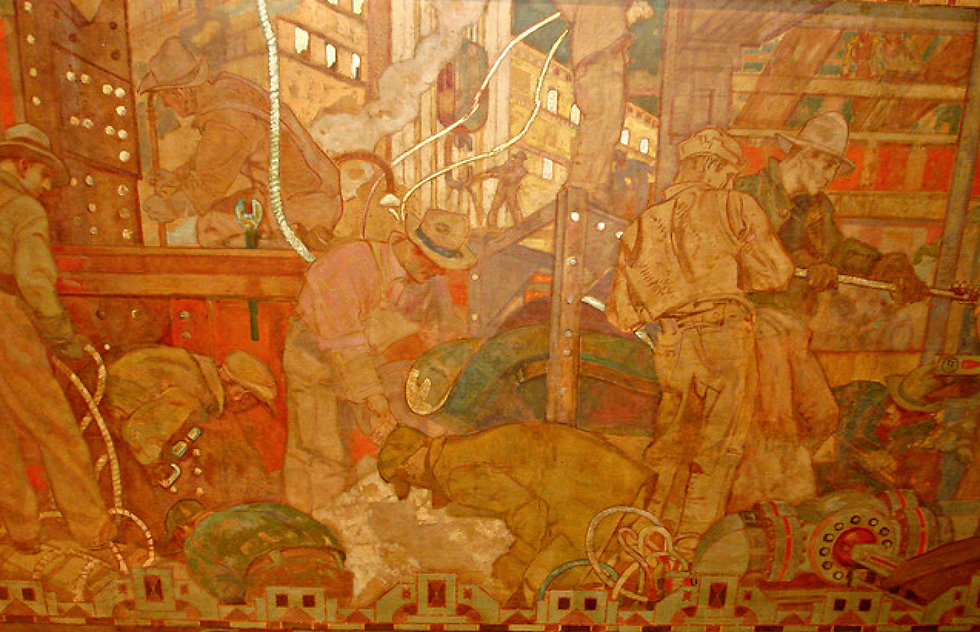History for sale
- Margareth
- Mar 21, 2019
- 3 min read
Updated: Aug 24, 2020
New York City’s iconic Chrysler Building is selling for $ 150 million

One of the most recognizable Art Deco building of New York City is reportedly to be on sale. Its owners, the Abu Dhabi Investment Council, put the building on the market last January for approximately $150 million. This amount seems to be well far below the $800 million the owners paid when they purchased the Chrysler Building 10 years ago. This drop on prices is attributable to New Yorkers Commercial property values that plummeted soon after the financial crisis struck.
During my trip in the United States - which took place almost 3 years ago - I could admire with my own eyes the majesty of some buildings built in the period in which the Art Deco style flourished. Honestly, I am not keen on recognising the different architectural styles but the Art Deco is a truly unique and distinctive one for me.
Art Deco style lines are known for their eye-catching and mesmerizing feature, which can project the viewer in a future that only those who lived in the past could imagine. “Wow, the future was then!” I told myself while admiring these amazing decorations. Its eclectic style combines traditional craft with motifs Machine Age imagery and materials. The colours are rich. Bold geometric shapes and lavish ornamentation kidnapped me at first glance!
These New York buildings represented the quintessential expression of modernity during the Art Deco era. They had totally new shapes for their time, such as: spheres, polygons, rectangles etc…, symmetrical patterns and sunburst motifs. New shapes combined with materials like stainless steel (of which several buildings were made of), aluminium, chrome and limestone.
Chrysler Building is a classic example of Art Deco architecture and considered by many contemporary architects to be one of the finest buildings in New York City.
Located on the East Side of Midtown Manhattan in New York City, it was built and comleted in 1930s to be the home of Chrysler corporate offices. It had to represent the automobile and the machine age of the 1920s that's why the stainless steel building was ornamented by the eagles “Gargoyles” on corners of the 61st floor, like the hood ornaments of the Plymouth automobile for example. The terraced crown, composed of seven radiating terraced arches, was made to look like the 1929 Chrysler radiator caps.
The lobby of the Crhysler Building is decorated with Egyptian motifs, frequently used by Art deco artists. But what cought my attention the most was the ceiling fresco "Transport and Human Endeavor" by Edward Trumbull portraying airplanes, buildings and some scenes from the Chrysler assembly line.












The history of the Chrysler Building is unavoidably linked to Walter P. Chrysler, one of the most famous automobile manufacturers of his time. In 1925, he founded the company that still bears his name. Aiming to give the company a prestigious headquarter, he commissioned the construction of one of the tallest skyscrapers in New York City and the whole world.
In order to make this dream come true, Walter Chrysler took contact with the same architect of the Brooklyn Bridge, William van Alen, a student of the Ecole des Beaux Arts in Paris. Mr. Van Allen decided to design an Art Decó style building with compositional elements that referred to the car, the future and of course the idea of the movement. His aim was that of making the Chrysler headquarter's skyscraper a symbol of pure modernity. The Chrysler Building was then created with a stainless steel spire which, with its three arched spans and triangular windows, had to replicate the motif of the radiators of the cars of the time.
“The reason so many people never get anywhere in life is because when opportunity knocks, they are out in the backyard looking for four-leaf clovers.”
― Walter P. Chrysler
The construction of the building was completed in 1930. With its 319 meters of height and 77 floors, culminating with an imposing 60-meter-high stainless steel spire called Vertex - that ends with a pointed pinnacle - it became soon the tallest and luxurious skyscraper in the world. Even after the construction of the Empire State Building it continued to remain an Art Deco symbol of the city of New York. This majestic building, which stands on the East Side of Manhattan along Lexington Avenue (one of the most prestigious streets in the world), was the tallest building on the Earth until 1931.
Constructed of a steel frame in-filled with masonry, with areas of decorative metal cladding, the structure contains 3,862 exterior windows. Approximately fifty metal ornaments protrude at the building's corners on five floors reminiscent of gargoyles on Gothic cathedrals. The 31st-floor contains gargoyles and replicas of the 1929 Chrysler radiator caps, the 61st eagles, a nod to America's national bird.




William van Allen succeeded then in putting his ideas into practice: he aimed to build not just a company headquarter but a leading example of Art Deco architecture.







Comments